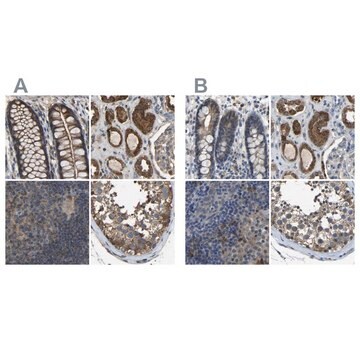RAB0537
Human FABP2 / Fatty Acid-Binding Protein, Intestinal ELISA Kit
for serum, plasma, cell culture supernatants and urine
Synonym(s):
FABP2 ELISA Kit, Intestinal FABP2 Detection
Sign Into View Organizational & Contract Pricing
All Photos(1)
About This Item
UNSPSC Code:
41116158
NACRES:
NA.32
Recommended Products
species reactivity
human
packaging
kit of 96 wells (12 strips x 8 wells)
technique(s)
ELISA: suitable
input
sample type plasma
sample type serum
sample type urine
sample type cell culture supernatant(s)
assay range
inter-assay cv: <10%
intra-assay cv: <12%
sensitivity: 25 pg/mL
detection method
colorimetric
shipped in
wet ice
storage temp.
−20°C
Gene Information
human ... FABP2(2169)
General description
The antibody pair provided in this kit detects Intestinal, Human Fatty Acid-Binding Protein in serum, plasma, cell culture supernatants, and urine.
Fatty acid-binding protein (FABP2) is an intracellular protein, encoded by the gene mapped to human chromosome 4q28–q31.It is expressed in intestinal enterocytes. FABP2 codes for intestinal FABP (I-FABP).
Fatty acid-binding protein (FABP2) is an intracellular protein, encoded by the gene mapped to human chromosome 4q28–q31.It is expressed in intestinal enterocytes. FABP2 codes for intestinal FABP (I-FABP).
Application
For research use only. Not for use in diagnostic procedures.
Please refer to the attached General ELISA KIT Procedure (sandwich, competitive & Indirect ELISA)
Please refer to the attached General ELISA KIT Procedure (sandwich, competitive & Indirect ELISA)
Biochem/physiol Actions
Fatty acid-binding protein (FABP2) plays a vital role in the absorption and intracellular migration of dietary long-chain fatty acids. It also helps in the metabolism of fatty acids. FABP2 acts as a candidate gene for diabetes and insulin resistance. It is also implicated in lipid metabolism and adipogenesis.
Other Notes
A sample Certificate of Analysis is available for this product.
Please type the word sample in the text box provided for lot number.
Please type the word sample in the text box provided for lot number.
Kit Components Also Available Separately
Product No.
Description
SDS
Signal Word
Warning
Hazard Statements
Precautionary Statements
Hazard Classifications
Met. Corr. 1
Storage Class Code
8A - Combustible corrosive hazardous materials
Flash Point(F)
Not applicable
Flash Point(C)
Not applicable
Choose from one of the most recent versions:
Already Own This Product?
Find documentation for the products that you have recently purchased in the Document Library.
Rosalie H Bartels et al.
Scientific reports, 9(1), 2304-2304 (2019-02-21)
Intestinal pathology in children with complicated severe acute malnutrition (SAM) persists despite standard management. Given the similarity with intestinal pathology in non-IgE mediated gastrointestinal food allergy and Crohn's disease, we tested whether therapeutic feeds effective in treating these conditions may
Salma A Khattab et al.
Journal of diabetes, 9(9), 821-826 (2016-10-26)
Intestinal fatty acid-binding protein 2 (FABP2) is expressed in enterocytes and binds saturated and unsaturated long-chain fatty acids. The FABP2 Ala54Thr polymorphism has been reported to effect lipid metabolism. The aim of the present study was to assess the relationship
Daniela Paganini et al.
Gut, 66(11), 1956-1967 (2017-08-05)
Iron-containing micronutrient powders (MNPs) reduce anaemia in African infants, but the current high iron dose (12.5 mg/day) may decrease gut In a 4-month, controlled, double-blind trial, we randomised Kenyan infants aged 6.5-9.5 months (n=155) to receive daily (1) a MNP without
Derrick R Samuelson et al.
PLoS pathogens, 13(6), e1006426-e1006426 (2017-06-13)
Chronic alcohol consumption perturbs the normal intestinal microbial communities (dysbiosis). To investigate the relationship between alcohol-mediated dysbiosis and pulmonary host defense we developed a fecal adoptive transfer model, which allows us to investigate the impact of alcohol-induced gut dysbiosis on
Christopher Storm-Larsen et al.
AIDS (London, England), 33(4), 645-653 (2018-12-12)
Translocation of microbial products such as lipopolysaccharides (LPS) from the gut may contribute to chronic inflammation in HIV-infected individuals. Recent studies indicate that differences in degree of acylation of gut-bacterial-derived LPS may explain variable immune effects, with hexa-acylated rather than
Our team of scientists has experience in all areas of research including Life Science, Material Science, Chemical Synthesis, Chromatography, Analytical and many others.
Contact Technical Service









